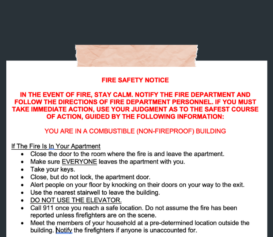While it’s not one of the compliance topics we typically review, we got a lot of questions about this most recent update – short-term rental regulations in NYC are coming. Here’s what you need to know:
New: Short-Term Rental Registration Portal
The city recently published rules outlining details for Local Law 18 (full text here) governing short-term rentals.
Starting March 6, 2023, the city is opening a registration portal for short-term rental hosts. Generally, Local Law 18 requires “hosts to register all units for rentals of 30 days or fewer with the city before Airbnb or any other listing platform may process payment from a guest.”
Click here to visit the registration portal, and access FAQs from the Mayor’s Office of Special Enforcement.
Please note – the registration portal and prohibited list portal can be accessed via the same link.
While Airbnb is one of the most popular short-term rental platforms, this rule doesn’t just apply to those hosts. Note the “any other listing platform” language. This includes VRBO, Booking.com, and similar sites. If you’re unsure whether or not a unit would be covered by this rule, here’s the full definition of a short term rental:
Short-term rental. The term “short-term rental” means a rental for fewer than 30 consecutive days of a dwelling unit within a private dwelling or class A multiple dwelling, or in the case of a mixed-use building, a rental of a class A dwelling unit therein for fewer than 30 consecutive days.
Per the city, “short-term rental listings for units in “Class B” multiple dwellings, which have been approved by the City of New York for legal short-term occupancies, are exempt from the registration requirement, as are rentals for 30 consecutive days or more.”
The information applicants need to provide is pretty extensive – you can see the full list in the rules here, and when the portal opens in March. Registration is non-refundable, costs $145, and lasts for 4 years. If an applicant’s right to occupy the dwelling will terminate in less than 4 years, OSE will set an expiration date that coincides with the same (though it can be extended).
Renewals can be requested starting 180 days before the expiration date. Upon expiration, all booking must cease immediately and pending reservations must be cancelled.
Registration Denials
Registration may be denied for the following reasons:
- There is an uncorrected violation that is based on the condition of the dwelling unit sought to be registered, and such violation is a Class 1 violation of the New York city construction codes, or a Class C violation of the housing maintenance code;
- Editor’s Note: Class 1 DOB-OATH violations (while issued to a specific named respondent) are usually associated with the building and not specific dwelling units, whereas Class C violations from HPD are associated with specific units. We’re unsure of how violations for different units or building-wide issues may impact specific short-term rental applications – stay tuned for more details as registration starts to take place in March
- There is an uncorrected violation of the fire code;
- There is an uncorrected violation for Work without a Permit pursuant to the New York city construction codes that is based on the condition of the dwelling unit sought to be registered;
- The dwelling unit is subject to a vacate order by any city agency, or to a stop work order issued by the department of buildings; or
- There is an uncorrected violation for Failure to File a Required Tenant Protection Plan pursuant to the New York city construction codes
Per the rules, determination of which violations would endanger occupants are exclusively for ” the purposes of determining whether to grant a registration or renewal and shall not be binding on or attributed to any other agency.” So the DOB, FDNY, HPD, or other agencies may not have any bearing on these decisions, or vice versa.
Requirements For Hosts
In addition to registering, hosts are required to abide by the following regulations:
- Include short-term rental registration number on all advertisements and offers for short-term rental
- Conspicuously post and maintain, within the dwelling unit, a diagram of normal and emergency exit routes and their short term rental registration certificate
- Retain records of short-term rental transactions for at least 7 years and provide such records to OSE (Mayor’s Office of Special Enforcement) upon request
Booking platforms are also required to abide by the law, verifying registration of posted rentals among other requirements.
Details For Property Owners
It’s stated multiple times in the rules that applying for registration for/approval of short-term rentals should not be construed as permission for violating a lease, cooperative bylaws, condominium association rules & regulations, or other laws (multiple dwelling, etc.). With that said, there is a path to notify the city about your preference for properties in your portfolio – with some important caveats.
As part of Local Law 18, property owners who don’t want to allow tenants to list short-term rentals can submit their address to a no-reservation list starting March 6th.
In order to be included on the prohibited buildings list, owners (including applicable cooperative or condominium boards/corporations) must apply. Applicants must provide specific personal and business information, and certify that leases and other occupancy agreements for dwelling units prohibit short-term rentals.
It’s a seemingly small but important detail that could impact a number of buildings. At first read, it seems like properties must have these clauses in leases or other occupancy agreements in order to apply to the prohibited list. That said, we have several asks into the OSE for clarification here, and look forward to providing an update. In the interim, we recommend conferring with your legal team/attorney to see how your team can best manage this part of the rules.
The OSE got back to us, and confirmed that they’re interpreting the above rule strictly. Specifically:
Pursuant to the Final Rules Governing Registration and Requirements for Short-Term Rentals, applicants for the prohibited buildings list “must certify that leases and other occupancy agreements for dwelling units within the building prohibit short-term rentals.”
We also asked if at least one lease/agreement within the building prohibits rentals, could that apply to all units within a building. The city referenced the above language, adding “Accordingly, the lease/occupancy agreements prohibiting short-term rentals must apply for the entire building.”
That said, Crain’s latest article contradicts this somewhat:
…property owners who do not want short-term hosting in their buildings can complete a five-minute application on the Office of Special Enforcement’s website, after which the building is automatically added to the list.
We’ll keep you posted on any changes here – whether it’s easier in practice to apply for the restricted list as Crain’s indicates, or the City is strictly enforcing the guidelines about lease & occupancy agreements.
Once the application for the prohibited list is made, building owners will be notified via letter. If added to the list, any short-term rental registrations issued prior to the addition will be revoked.
On the flip side, when individuals complete short-term rental registration applications, the owner of record for the building will be notified. Such notification will not include “any personal identifying information about the applicant.” It’s unclear whether or not the specific location – say, a unit number – is considered personal identifying information. The notification WILL include a reminder for adding properties to the no-reservation list.
Additionally, specific properties may not be granted registration or renewal, per the rules. These properties will also be added to the prohibited buildings list by the OSE directly. Click below to see the full list:
Enforcement of Local Law 18
Per Crain’s,
The law still requires enforcement to begin on May 9, but the wording on the Office of Special Enforcement’s website on Feb. 2 seemed to alter that date: “Enforcement of the registration requirements will not begin until July 2023,” it read.
The enforcement office has 13 people budgeted to review listing submissions and the prohibited building list. It said it plans to do the reviews as quickly as possible.
Depending on the infraction, civil penalties range from $100 to $5,000 and may be eligible for the cure process. And on quick review, many of these infractions appear to be specific to the applicant for registration as a named respondent (and not the building itself). Still, these violations would still appear on record for a property and could cause headaches for owners.
Second/subsequent violations are for the same named respondent, within 3 years of the prior infraction.
If you have additional questions, check out the city’s FAQ list on the Special Enforcement page.
While registrations aren’t open just yet, we’ll be sure to post the link/applications to both the short-term rental registration and prohibited building list registration as soon they’re available. Stay tuned to the Blog and (if you’re a SiteCompli user) our monthly newsletter for more updates!




